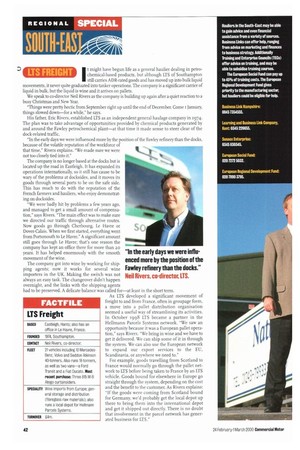I t might have begun life as a general haulier dealing
Page 44

If you've noticed an error in this article please click here to report it so we can fix it.
in petrochemical-based products, but although LTS of Southampton still carries A DR-rated goods and has moved up into bulk liquid movements, it never quite graduated into tanker operations. The company is a significant carrier of liquid in bulk, but the liquid is wine and it arrives on pallets.
We speak to co-director Neil Rivers as the company is building up again after a quiet reaction to a busy Christmas and New Year.
"Things were pretty hectic from September right up until the end of December. Come r January, things slowed down—for a while," he says.
His father, Eric Rivers, established ITS as an independent general haulage company in 1974. The plan was to take advantage of opportunities provided by chemical products generated by and around the Fawley petrochemical plant—at that time it made sense to steer clear of the dock-related traffic.
"In the early days we were influenced more by the position of the Fawley refinery than the docks, because of the volatile reputation of the workforce of that time," Rivers explains. "We made sure we were not too closely tied into it."
The company is no longer based at the docks but is located up the road in Eastleigh. It has expanded its operations internationally, so it still has cause to be wary of the problems at docksides, and it moves its goods through several ports to be on the safe side.
This has much to do with the reputation of the French farmers and hauliers, who enjoy demonstrat ing on docksides.
"We were badly hit by problems a few years ago, and managed to get a small amount of compensa tion," says Rivers. "The main effect was to make sure we directed our traffic through alternative routes.
Now goods go through Cherbourg, Le Havre or Dover-Calais. When we first started, everything went from Portsmouth to Le Havre," A significant amount still goes through Le Havre; that's one reason the company has kept an office there for more than 20 years. It has helped enormously with the smooth movement of the wine.
The company got into wine by working for shipping agents; now it works for several wine importers in the UK. Making the switch was not always an easy task. The changeover didn't happen overnight, and the links with the shipping agents had to be preserved. A delicate balance was called for—at least in the short term.
LTS FREIGHT
"In the early days we were influenced more by the position of the Fawley refinery than the docks." Neil Rivers, co-director, LTS.
As LTS developed a significant movement of freight to and from France, often in groupage form, a move into a pallet distribution organisation seemed a useful way of streamlining its activities. In October 1998 LTS became a partner in the Hellmann Parcels Systems network. "We saw an opportunity because it was a European pallet operation," says Rivers. "We bring in wine and we have to get it delivered. We can ship some of it in through the system. We can also use the European network to expand our export services to the EU, Scandinavia, or anywhere we need to."
For example, goods travelling from Scotland to France would normally go through the pallet network to LTS before being taken to France by an LTS vehicle. Goods bound for elsewhere in Europe go straight through the system, depending on the cost and the benefit to the customer. As Rivers explains: "If the goods were coming from Scotland bound for Germany, we'd probably get the local depot up there to bring them into the international depot and get it shipped out directly. There is no doubt that involvement in the parcel network has generated business for LTS."












































































































